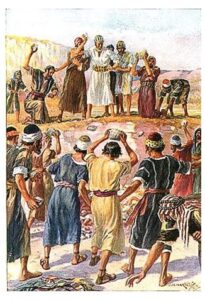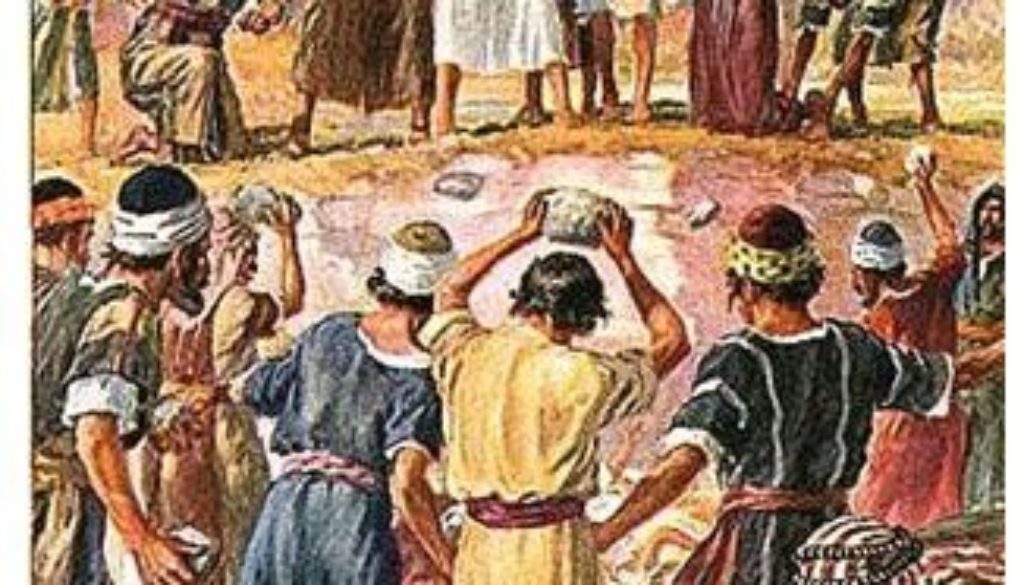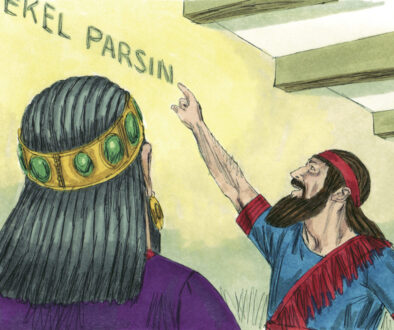Numbers 15:32-36 An Example

God sticks to His laws with His people. He gives them firm examples as to why they should too.
Reading this story might make one think God is harsh and uncaring. You could also try and argue that the punishment didn’t fit the crime. I know I see elements of that when I just read the words laid down here for us. But then I think deeper about what was going on at the time and how this lesson would impact Israel’s future.
I want to look at this story from five different perspectives. First is the man who was gathering sticks that Sabbath morning. The second is the group who caught him in the act. The third is the members of the congregation. The fourth is Moses. And the fifth is God.
Our man out gathering sticks is up first. I’m wondering why he was out there on a Sabbath. Did he not gather enough of Friday to hold him through the Sabbath? Was he gathering sticks because his family was cold? Did he possibly stay out gathering until just after the Sabbath began?
WHY did he do it? He knew God’s law as well as the rest of the people in the camp. We are not told he was a sojourner so I assume he was one of the children of Israel. Even if he was, God clearly stated that anyone living in the camp was to follow the same set of rules. Did he do it out of disrespect for God’s laws? Was he one of the people who were always complaining? Or did he do it out of need? Was it an intentional sin?
Let’s move onto the next group; those who caught him in the act. I’m curious as to how they found him. Was he picking up sticks near their tents or were they out wandering around? Did they come across him or him across their path? Were the people actively looking for “rule breakers”? Or was this discovery something that tore their heart right open?
WHY did they bring him in? This group could have easily looked the other way and pretended not to see what was going on. They could also have tried to “blackmail” the man by promising to tell if he didn’t do something for them. But instead they chose to bring him to Moses. Was it because they were trying to win favor with Moses and God after the disaster that had just transpired? Or where the rededicating themselves to following God’s law to the letter?
Onto the third perspective; the congregation. I have fewer questions for them. They seemed to follow along most of the time. Once someone got things moving in one direction they seemed to go along to its conclusion, including stepping into sin. But were there any within the group who wondered about what I was wondering? Did anyone ask the “why” questions? Or was the whole group so afraid of angering God again that they didn’t dare raise any questions? Their only response was “when God says ‘jump’ we ask ‘how high’.” I can understand that attitude after all that has happened.
The fourth perspective is that of Moses. Moses has seen it all with this group. From dancing with joy over one of God’s miracles, to swearing their allegiance forever, to grumbling for something else to eat, to erecting another god, to blatantly turning away to ‘go home’ again. Nothing this group does should surprise him. He has also learned that he has to seek God on every important issue. He doesn’t pass judgement on the man. He leaves that in God’s hands. He knows God’s laws better than anyone else in the camp. He also knows God better than anyone else. But he doesn’t presume to speak for Him. Nor does he ask the questions I’ve raised. He trusts God to know the answers to any question needed.
Moses is at peace with whatever God decides. He will pass that decision onto the people. The people will do as God commands. And the man’s fate will be an example for all to remember.
Finally we get to God’s perspective. He could have given this man mercy. He could have told the people who found him to “mind their own business.” He could have told the congregation to get busy working on their own issues. He could have said “Take care of the log in your own eye before worrying about the speck in your brother’s.” But He didn’t.
He knew the answers to the questions I already asked. He knew them before they were even posed. He also knew that this group of people needed some “crackdown time.”
When my children were growing up we went through seasons where they stopped listening and were more disobedient. With four of them very close in age and being a single parent I found those times especially trying. Even when I was a single parent because of Army issues those times came up.
In order to restore harmony and order in our home I did what we called “crackdown time.” This meant that the rules became more solid, including how many times they were told to do something before consequences were meted out. One of my famous lines when entering one of these phases was “I love you very much, but right now I don’t like you at all.” That was because their behavior was so out of control that I had a hard time finding something good in our day.
We would then go through a “relearning phase” where they be expected to behave according to the rules completely. After they proved themselves capable of following the rules for a time then the reigns would be relaxed again to allow possible exceptions and mercy when appropriate. I believe God was in the first phase of this process; the “relearning phase.”
God knew the man’s heart. I believe if it was truly an accident or an unintentional sin the punishment would have fit the crime. I believe the answer to my first question was that the man purposefully ignored God’s directive for his own reasons.
Because the group that brought the man to Moses wasn’t also charged with breaking the Sabbath, I’m going to assume that God knew the answer to the question I asked about them. They were observing the Sabbath as required and this man came across their path. They didn’t seek him out to turn him in. They were trying to follow God’s laws with all their heart.
The congregation did exactly as they were expected to. The man’s family didn’t rush forth and try and save him. They were probably afraid of suffering his same fate.
Moses knew not to question God’s commands. He knew that whatever decision God rendered was best for all His people. He had observed God’s compassion and His judgement. He would follow the Lord’s command whatever it was.
So this story served two purposes. The first was to show the single individual that God meant what He said. God’s laws weren’t suggestions to be taken however one wanted to. They were hard and fast rules He expected His people to follow. The second was to show the people that God kept His word. He promised consequences for those who disobeyed Him; especially for those who did so intentionally.
Father God, thank You for taking me through the process to show me the importance of Your decision in this story. Thank You for reminding me, by letting me ask my questions, that You DO know our hearts. You show mercy to those whom You will and by Your own judgement. I won’t say to those who “deserve” it because none of us really do. That was a lesson from the last time we were together regarding “unintentional sin.” I know there are lines to be drawn and that YOU are the one who can do so without fault.
I’m sorry You had to go through “crackdown time” too. I wish I had been more consistent so that there wouldn’t have been a need for those redirecting cycles. Thank You for loving me through my own “crackdown times” with You. I’ve been pulled back into line more than once and am grateful for it. That was one way I KNEW I hadn’t been thrown out as a hopeless mess. Remind me of these lessons the next time I find myself in the “relearning phase” again. I pray there aren’t any more looming on the horizon but I know myself too well to think I’m forever through with my lessons.



